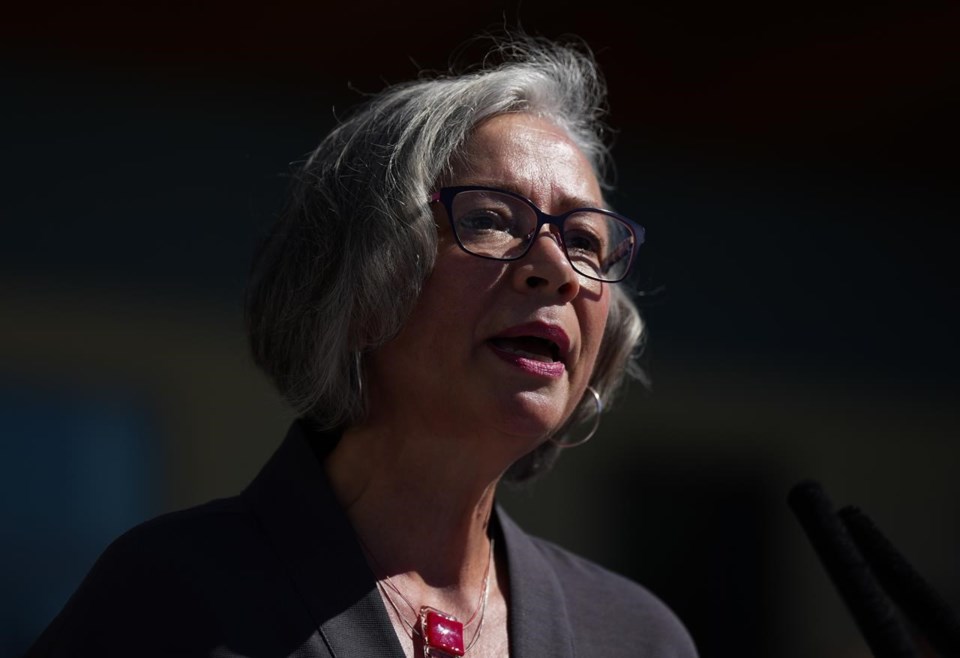BURNABY, B.C. — Families with young kids in licensed child care in British Columbia will see their monthly fees drop automatically by up to $550 a month starting Dec. 1, says Education and Child Care Minister Jennifer Whiteside.
The fee reductions will mean families with children in kindergarten and younger in eligible care, or about 69,000 kids, will receive the lower fees, she said at a news conference Friday at a Burnaby elementary school that provides child-care services.
The lower fees are being welcomed by the Opposition Liberals and Indigenous groups in the province, but both say there is much more work to do in getting the money to families and increasing access to child care.
The savings for families are on top of earlier reductions of $350 per month for children under three years old in group care, which will cut fees by $900 a month, Whiteside said.
"We are moving towards our goal of $10-a-day child care for every family by reducing fees for parents and supporting providers," she said.
The New Democrat government made $10-a-day child care an election promise and by Dec. 31 it expected to have created 12,500 spaces at that rate, Whiteside said.
Katrina Chen, B.C.'s minister of state responsible for child care, said the fee reduction program with its 96 per cent participation rate in licensed centres across the province is "a huge achievement."
"When you think about $900 per month, per child, that is huge," said Chen. "To all the parents, I want to tell you as a mother myself, we feel you. We feel you and understand that child care is critical for our economy, for our young children and for our families' well-being."
She thanked child-care providers who have partnered with the government, but could not immediately estimate the number of unlicensed daycare operations in B.C.
The Ministry of Education and Child Care said there were 132,000 spaces for children from infants to 12 years old in licensed daycares.
The families who will receive the fee reduction have children in child care in kindergarten and younger.
The arrival of the fee reductions will be welcomed by families, but the Opposition Liberal child-care critic Karin Kirkpatrick said the government's rollout of its promised $10-a-day child care is moving too slowly.
"So, only 6,000 spaces out of 130,000 are currently $10-a-day," said Kirkpatrick. "When is it going to happen and why is it only a select few families getting the $10-a-day benefit?"
Karina Gould, the federal minister of families, child care and social development, said the federal-provincial partnerships on child care are a "nation-building endeavour" similar in transformation to the introduction of medicare in Canada.
"I like to talk about child care as a home run because it's good for our kids," she said. "It's good for our families and it's really good for our economy."
Women most often feel the brunt of high child-care costs, and lower fees will help family finances and allow parents to pursue career and other opportunities, Gould said.
B.C. was the first province to sign on to the federal government's $30-billion early learning and child-care plan and will receive $3.2 billion over five years.
Families in B.C. with children in kindergarten registered in before- and after-school care will see monthly reductions of $220 on top of earlier cuts of $100, said an Education Ministry statement.
The fee reductions will bring the average daily cost of licensed child care in the province to $21 by the end of the year, down from the average of $53 before the government's child-care initiatives began in 2018, said the ministry.
A statement from the First Nations Leadership Group, made up of leaders from the B.C. Assembly of First Nations, the First Nations Summit and the Union of BC Indian Chiefs, said the fee reductions will help families enrol their children inchild care and preschool programs, which were previously unaffordable to many.
"The massive changes announced today increase First Nations access to affordable child care; however, ongoing efforts are needed to prioritize and address long-standing gaps in access to affordable child care experienced by First Nations in rural, remote and reserve communities,” said Terry Teegee, a B.C. Assembly of First Nations regional chief.
— By Dirk Meissner in Victoria
This report by The Canadian Press was first published Sept. 23, 2022.
The Canadian Press



